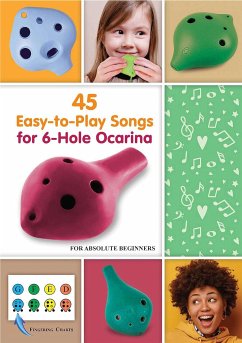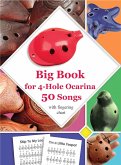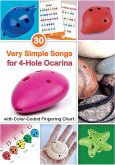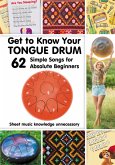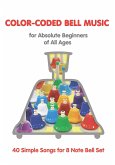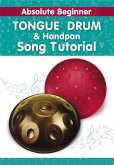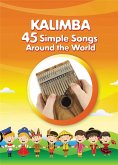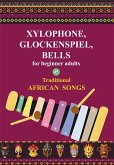My sheet music includes fingering positions, letter-coded notation, and song lyrics for a 6-hole ocarina. Although your ocarina has just 6 holes, this small instrument can produce 10 natural notes, the full range from C to C, plus D and E of the next octave and 7 flat and sharp notes: a total of 17 notes.
The fingering positions are shown in the e-book graphically on an image of a standard shaped ocarina with six holes. Each hole on the ocarina is represented by circles. The circles outside of the ocarina image represent the holes on the back side of the instrument. The circles filled in black indicate which holes should be covered while playing. The open circles mean they should be uncovered. The bottom circles correspond to the holes on the ocarina that are closest to your mouth. Circles on the left are played using the left hand and are played with the index and middle fingers, while those on the right side are played with the same fingers on the right hand.
As for the circles outside of the image, they indicate that your thumbs should be used on the holes underneath the instrument.
People always connect musical notes with a specific color. This is called sound-color synesthesia. The most popular system is the chakra system, according to which, the seven notes of the major diatonic scale correspond to seven chakras or energy wheels surrounding the body. I also use this color scale for better visualization.
The 6-hole Ocarina can produce a basic scale plus semitone notes, so you can still play more challenging chromatic melodies with it. My sheet music is based on a 6-hole ocarina tuned in C Major. It covers a pitch range from С5 to E6 and is capable of sharps and flats. C major 6-hole ocarina, which is the most popular model on the market. However, you can have E, F, G, B, and B-flat major ocarinas, which have different fingerings. Be careful, you've been warned.
Contents
A Tisket, a Tasket
Are You Sleeping
Auld Lang Syne
Aura Lee
Au Clair de la Lune
Baa, Baa Black Sheep
Bingo
Bye Baby Bunting
Happy Birthday
Here We Go Round the Mulberry Bush
Hey, Diddle Diddle
Hickory Dickory Dock
Hot Cross Buns
Humpty Dumpty
I'm a Little Teapot
If You're Happy and You Know It
Itsy Bitsy Spider
Jingle Bells
Jolly Old Saint Nicholas
Kumbaya
Lavender's Blue
Little Jack Horner
London Bridge
Mary Had a Little Lamb
Misty Mountains
My Bonny Lies Over the Ocean
O, Christmas Tree (O, Tannenbaum)
Oh My Darling, Clementine
Old MacDonald Had a Farm
Rain, Rain, Go Away
Pop! Goes the Weasel
Ring Around the Rosie
Row Row Row Your Boat
The Bear Went Over the Mountain
The First Noel
The Muffin Man
This Old Man
The Wheels on the Bus
Ten Little Fingers
Twinkle, Twinkle Little Star
We Wish You a Merry Christmas
When the Saints Go Marching In
What Shall We Do With the Drunken Sailor
99 Bottles of Beer
The fingering positions are shown in the e-book graphically on an image of a standard shaped ocarina with six holes. Each hole on the ocarina is represented by circles. The circles outside of the ocarina image represent the holes on the back side of the instrument. The circles filled in black indicate which holes should be covered while playing. The open circles mean they should be uncovered. The bottom circles correspond to the holes on the ocarina that are closest to your mouth. Circles on the left are played using the left hand and are played with the index and middle fingers, while those on the right side are played with the same fingers on the right hand.
As for the circles outside of the image, they indicate that your thumbs should be used on the holes underneath the instrument.
People always connect musical notes with a specific color. This is called sound-color synesthesia. The most popular system is the chakra system, according to which, the seven notes of the major diatonic scale correspond to seven chakras or energy wheels surrounding the body. I also use this color scale for better visualization.
The 6-hole Ocarina can produce a basic scale plus semitone notes, so you can still play more challenging chromatic melodies with it. My sheet music is based on a 6-hole ocarina tuned in C Major. It covers a pitch range from С5 to E6 and is capable of sharps and flats. C major 6-hole ocarina, which is the most popular model on the market. However, you can have E, F, G, B, and B-flat major ocarinas, which have different fingerings. Be careful, you've been warned.
Contents
A Tisket, a Tasket
Are You Sleeping
Auld Lang Syne
Aura Lee
Au Clair de la Lune
Baa, Baa Black Sheep
Bingo
Bye Baby Bunting
Happy Birthday
Here We Go Round the Mulberry Bush
Hey, Diddle Diddle
Hickory Dickory Dock
Hot Cross Buns
Humpty Dumpty
I'm a Little Teapot
If You're Happy and You Know It
Itsy Bitsy Spider
Jingle Bells
Jolly Old Saint Nicholas
Kumbaya
Lavender's Blue
Little Jack Horner
London Bridge
Mary Had a Little Lamb
Misty Mountains
My Bonny Lies Over the Ocean
O, Christmas Tree (O, Tannenbaum)
Oh My Darling, Clementine
Old MacDonald Had a Farm
Rain, Rain, Go Away
Pop! Goes the Weasel
Ring Around the Rosie
Row Row Row Your Boat
The Bear Went Over the Mountain
The First Noel
The Muffin Man
This Old Man
The Wheels on the Bus
Ten Little Fingers
Twinkle, Twinkle Little Star
We Wish You a Merry Christmas
When the Saints Go Marching In
What Shall We Do With the Drunken Sailor
99 Bottles of Beer

